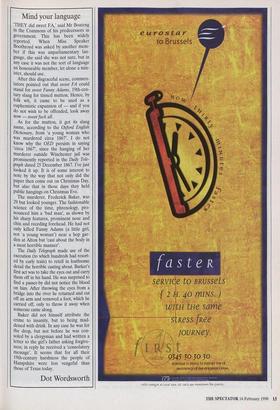Mind your language
`THEY did sweet FA,' said Mr Boateng in the Commons of his predecessors in government. This has been widely reported. When Miss Speaker Boothroyd was asked by another mem- ber if this was unparliamentary lan- guage, she said she was not sure, but in any case it was not the sort of language an honourable member, let alone a min- ister, should use.
After this disgraceful scene, commen- tators pointed out that sweet FA could stand for sweet Fanny Adams, 19th-cen- tury slang for tinned mutton. Hence, by folk wit, it came to be used as a euphemistic expansion of — and if you do not wish to be offended, look away now — sweet fuck all.
As for the mutton, it got its slang name, according to the Oxford English Dictionary, from 'a young woman who was murdered circa 1867'. I do not know why the OED persists in saying `circa 1867', since the hanging of her murderer outside Winchester jail was prominently reported in the Daily Tele- graph dated 25 December 1867. I've just looked it up. It is of some interest to note by the way that not only did the paper then come out on Christmas Day, but also that in those days they held public hangings on Christmas Eve.
The murderer, Frederick Baker, was 29 but looked younger. The fashionable science of the time, phrenology, pro- nounced him a tad man', as shown by his sharp features, prominent nose and chin and receding forehead. He had not only killed Fanny Adams (a little girl, not 'a young woman') near a hop gar- den at Alton but 'cast about the body in a most horrible manner'.
The Daily Telegraph made use of the execution (to which hundreds had resort- ed by early train) to retell in loathsome detail the horrible casting about. Barker's first act was to take the eyes out and carry them off in his hand. He was surprised to find a passer-by did not notice the blood on him. After throwing the eyes from a bridge into the river he returned and cut off an arm and removed a foot, which he carried off, only to throw it away when someone came along.
Baker did not himself attribute the crime to insanity, but to being mad- dened with drink. In any case he was for the drop, but not before he was con- soled by a clergyman and had written a letter to the girl's father asking forgive- ness; in reply he received a 'consolatory message'. It seems that for all their 19th-century harshness the people of Hampshire were less vengeful than those of Texas today.
Dot Wordsworth

























































 Previous page
Previous page